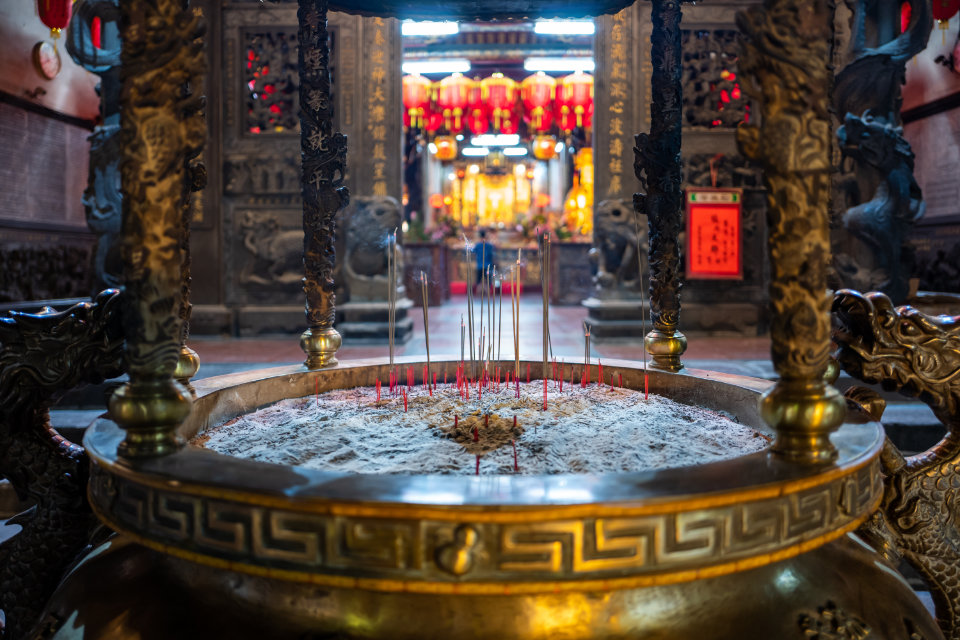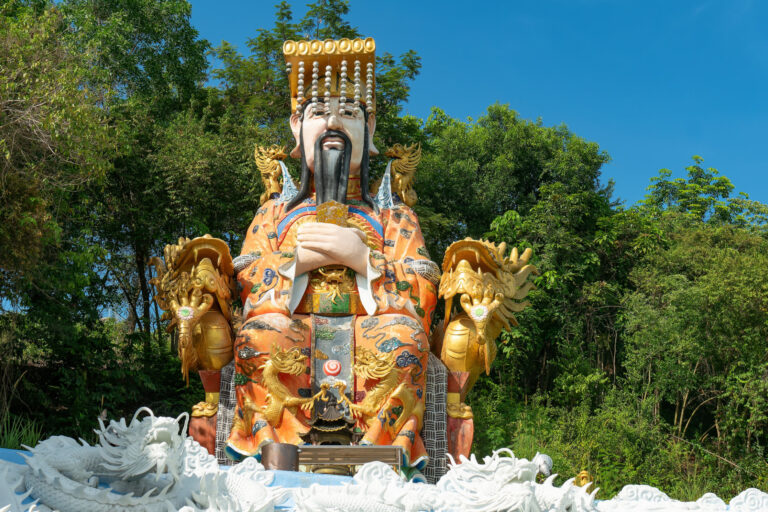During the Lunar New Year, on the ninth day, it is common to see neighbors and community members cleaning their houses and preparing offerings to worship the Jade Emperor, followed by the loud sounds of firecrackers.
This day is known as the Jade Emperor’s birthday or “Heaven’s Birthday.” For many devotees, this is an important day. In Fujian, it is even referred to as “celebrating the Little New Year.” On this day, people worship to express gratitude to the Jade Emperor for his blessings and pray for peace.
But do you know why people worship the Jade Emperor, or if the steps you follow at home are correct? Are you aware of the many taboos associated with this worship? Let us answer these questions for you!
Table of Contents
The Origin of Worshiping the Jade Emperor
The “Jade Emperor” in Taoism refers to the “Jade Emperor” or the “Primordial Heavenly Venerable.” He is the supreme deity who governs the universe, commanding the three realms, ten directions, four life forms, and six paths. But why do people worship the Jade Emperor? There are several theories:
- It traces back to the creation myth of Nüwa, who created the world and all living beings. The first ten days of the lunar year are dedicated to the ‘Chicken’, ‘Dog’, ‘Pig’, ‘Sheep’, ‘Cow’, ‘Horse’, ‘Human’, ‘Grain’, ‘Heaven’, and ‘Earth’, with the ninth day being ‘Heaven’s Day’ and the tenth day ‘Earth’s Day’, marking the Jade Emperor’s and the Earth God’s birthdays respectively.
- Taoism views the first month as the beginning of the year, the start of the seasons, and the origin of wood element, where life begins to sprout. The number ‘nine’ is considered the ultimate yang number in Chinese culture, symbolizing ‘innumerability’ and ‘maximum’, hence the first ninth day of the year is celebrated as the Jade Emperor’s birthday.
- A folk belief suggests that on the ninth day of the first month, the Jade Emperor manifested himself to save lives, hence people worship to thank him for his grace.
Regardless of the theory, people worship the Jade Emperor on this day is to show respect and gratitude to heaven!

Why Do Hokkien People Worship the Jade Emperor?
Worshiping the Jade Emperor is a significant custom among Hokkien people, widely practiced in Fujian, southern Fujian, Hainan, Taiwan, Singapore, Malaysia, and other areas with Hokkien/Minnan communities.
There are various folk tales, but the most popular one dates back to the Ming Dynasty. During one Lunar New Year, Japanese pirates raided the Fujian coast, killing and looting.
As locals fled with their families, they stumbled upon a sugarcane grove that offered a hiding place, allowing them to escape unharmed.
Many believe this was the Jade Emperor’s blessing, leading to the annual worship on the ninth day of the first month to thank him for saving their lives, with sugarcane becoming an essential offering. Sugarcane when pronounced in Hokkien rhymes with “thank you”.
This is the origin of the Hokkien/Minnan people’s tradition of worshiping the Jade Emperor!
When to Worship the Jade Emperor?
The days designated to worship the Jade Emperor include Chinese New Year’s Eve, the first day of the Lunar New Year, and the ninth day of the first lunar month.
- Chinese New Year’s Eve: Many families thank the Jade Emperor for his care over the past year by worshipping him from 11 PM on New Year’s Eve to 1 AM the following day, a practice known as “bidding farewell to the old year.”
- The First Day of the Lunar New Year: Some people worship the Jade Emperor from 11 PM on New Year’s Eve to 1 AM on the first day of the lunar new year, celebrating the arrival of the New Year, also called “greeting the new.”
- The Ninth Day of the First Lunar Month: The ninth day of the first lunar month is the Jade Emperor’s birthday, also known as “Heaven’s Birthday.” The main worship takes place at midnight on this day, with the latest offerings made before 7 AM the following morning. It’s believed that the earlier one worships, the more sincere the devotion.
Dates to Worship the Jade Emperor in 2024
- On 9 February 2024 (29th day of the 12th lunar month), the best time for worship is during Zi Hour (11 pm to 1 am on the eve of the Lunar New Year’s Eve).
Offerings include Heavenly Gold, various meats, fruits (apples, pears, pineapples, sugarcane – all in odd numbers), rice cake, sugar cake, candies (winter melon candy, pistachios, peanut candy), dry goods (lily buds, glass noodles, black fungus), flowers, candles, and tea. - On 10 February 2024 (1st day of the 1st lunar month), the auspicious time is from Zi Hour (11 pm of Lunar New Year’s Eve to 1 am) to Wu Hour (11 am to 1 pm).
Offerings are similar but include radish cake, raw rice, and alcoholic beverages. - On 18 February 2024 (9th day of the 1st lunar month), worship is ideal from Zi Hour (11 pm of the 8th day to 1 am) to 6 am.
Offerings include Heavenly Gold, fruits, desserts, and red turtle cakes.
How to Worship the Jade Emperor?
Learn the traditional steps to respectfully worship the Jade Emperor (拜天公) during Chinese New Year, ensuring prosperity and blessings for the year ahead.
Total time: 1 hour
Bathe and Change into New Clothes
Before worshiping, take a bath and change into appropriate attire that are festive in color as a sign of respect for the Jade Emperor. Then, adjust your mood and avoid getting angry.
Set Up the Offering Table:
The offering table should be set up under the “Jade Emperor stove” or in an unsheltered outdoor area facing the sky. The upper table (top table) should be near the fence gate, while the lower table should be closer to the house’s main door. Tie a sugarcane on each side of the table to symbolize prosperity.
Turn On All Lights in the House
Turn on all the lights in the house, and you can also play some New Year songs to create a joyful and harmonious atmosphere, getting ready to worship the Jade Emperor with happiness.
Arrange Offerings and Paper Money:
The offerings vary between the top table (for the Jade Emperor) and the bottom table (for subordinate deities). The top table should include vegetarian offerings, such as flowers, candles, tea, longevity noodles, fruits, and vegetarian dishes. The bottom table is for the subordinate deities and includes meat dishes, tea or wine, fruits, and cakes.
Worship Household Deities and Ancestors First
If there are household deities and ancestors in the home, remember to offer incense and greetings to them before worshipping the Jade Emperor, as the deities and ancestors protect us daily, ensuring our safety.
Offer Tea and Alcohol Before Worship
It’s customary to offer tea first and then alcohol. Around midnight, we can first offer tea, then offer alcohol. The cups for tea and alcohol must be placed close to the incense burner.
Worship the Jade Emperor Procedure (Simplified):
The eldest family member leads the worship with three kneels and nine bows (now often simplified). Each family member lights three incense sticks in order of seniority, recites the “Jade Emperor’s Birthday Prayer.
After making wishes, led by the male head of the household, everyone kneels and bows sincerely three times. Hold the incense above the head, arms spread, then bow deeply.
When the incense has burned down to one-third, you can throw sacred cups or coins to seek the Jade Emperor’s permission. After receiving approval from the heavens, prepare to burn the offerings and sacrificial materials.
Set off firecrackers if allowed, and finally, sprinkle wine over the burnt paper money.
(Note: The names and address on the prayer must be correctly written in black ink.)
Prayers to recite:
「天公祖在上,弟子(信女)OOO,住在 OOO,今天初九喜逢玉皇大天尊圣诞万寿,接受弟子(信女)OOO 一家虔诚祝寿与简单供品礼敬,还请玉皇大天尊笑纳,并祈求保佑(信女)OOO 一家平安顺利、消灾增福.
Begins by acknowledging the Jade Emperor’s divine status, followed by the worshipper introducing themselves (name, age) and their residence. The worshipper then celebrates the Jade Emperor’s birthday, offering humble respects and simple gifts. The prayer concludes with a request for the Jade Emperor to accept these offerings and to bless the worshipper’s family with peace, success, and increased fortune while alleviating disasters.
The Family Stays Nearby to Receive the Jade Emperor’s Blessings
The family stays near the offering table, chatting and eating New Year cakes. Eating the offerings dedicated to the Jade Emperor is very auspicious, as it can bring blessings, longevity, and improve luck.
Taboos in Worshiping the Jade Emperor
Not everyone is allowed to worship the Jade Emperor.
- Those in mourning, women in confinement, and women on their menstrual cycle are prohibited from worshiping.
- The chicken offered must be a castrated rooster. White-feathered chickens and hens are not allowed.
- Do not hang underwear outside, especially women’s underwear, which is considered a major taboo.
- Avoid using vulgar language. Refrain from using inauspicious words to avoid disrespecting the Jade Emperor.
- Do not dispose of waste carelessly. Household waste water should not be dumped outside, to avoid defiling the Jade Emperor’s presence.
- Do not sweep the floor. On the ninth day, do not sweep outdoors, and indoor trash should be disposed of the next day.
- No Slaughtering. On the day of worship, any form of slaughtering is strictly forbidden.
- Before you worship the Jade Emperor, it is not permissible to be drunk, as slurred speech and the smell of alcohol can negatively impact both oneself and others nearby.
There are specific items that should not be used as offerings, including fruits that should not be placed on the offering table:
- Fruits with “fan” in their name: Fruits with “fan” in their name carry inauspicious meanings, such as guava (fan shi liu) and tomato (fan qie), and are not suitable.
- Fruits with strong odors: Durian’s pungent and strange odor makes it unsuitable for worship.
- Custard apple (Shijia): Its appearance resembling the head of “Sakyamuni Buddha” makes it inappropriate for offerings.
- Plums: Due to Laozi (also known as Taishang Laojun) having the name Li Er, to avoid his name, Taoism does not use plums.
- Exotic fruits: Such as starfruit (yang tao), using foreign foods for worship is seen as insincere and thus not suitable.
- Fruits with many seeds: As fruits like guava and tomatoes can cause indigestion and their seeds spread everywhere after consumption, making them feel unclean, they are also not suitable for worship.
Generally, “round fruits” are more welcomed because they symbolize “completeness.”
Not worshipping the Jade Emperor won’t necessarily bring misfortune, but offering worship ensures blessings. If time is tight, even a brief visit to pay respects at a nearby temple can be meaningful. Worship is a cherished tradition inherited from our ancestors, carrying deep significance. Always remember, it’s essential to maintain respect when you worship the Jade Emperor.
Worshipping the Jade Emperor (拜天公) in CNY 2024
For Hokkien people and many others in the Chinese community, worshiping the Jade Emperor is an important tradition and ritual, with meticulous attention paid to the timing and arrangement of offerings.
We hope this introduction helps you understand the origins and requirements of worshiping the Jade Emperor!
What offerings are appropriate for worshipping the Jade Emperor?
Offerings typically include incense, candles, fruits (such as apples, oranges, and pineapples), traditional sweets, ‘Heavenly Gold’ paper, tea, wine, roasted pig, vegetarian dishes, flowers, and symbolic items like gold ingots or jade. Also, dishes like steamed fish, chicken, and dumplings are often included, each symbolizing different blessings and prosperity.
What time should I worship the Jade Emperor?
Worship the Jade Emperor is typically done during Zi Hour (11pm to 1am), which is late at night to early morning.
Can I perform the worship at temple?
Yes, you can perform the worship of the Jade Emperor at a temple. Many people choose to do so, as temples often have special arrangements and rituals for this important occasion. At the temple, you can participate in communal ceremonies and benefit from the guidance of religious experts, enhancing the spiritual experience. Worshiping at a temple also allows for a more traditional and elaborate celebration compared to home rituals.




2 Comments
Hai Master, if did not pray on the eve of CNY 30th day. What the consequences ? How to retify it?
Hi Lucas,
Missing prayers on the eve of the 30th day of Chinese New Year to the Jade Emperor need not cause major worry. Spirituality places greater value on intention and sincerity rather than strict adherence to ritual timings.
Regarding your concerns:
Consequences: These are generally minor, as spiritual practices are understanding of human circumstances.
Rectification: At your earliest convenience, offer your prayers and intentions sincerely. Express your regrets for any unintentional oversight and share your wishes for the year.
Remember, it’s the sincerity and heartfelt nature of your intentions that are most important.
Wishing you peace and happiness in the year ahead.